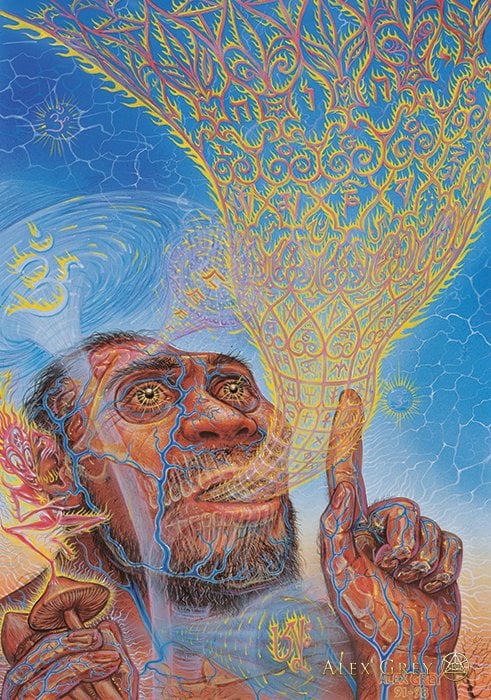Language works when we think the same, connecting the words to the same meanings and such. But that never actually happens 100%. It might be closer to 80%. (or if it’s a strange subject, 15%)
So this “conversation” that we’re having here is, to some degree, not actually happening.
But we pretend that it is.
So how much are we pretending? How much of the conversation is hallucinatory conversation?
From a technical perspective, you might wanna look at https://en.wikipedia.org/wiki/Noisy-channel_coding_theorem
It basically says, that even when your channel over which you’re transmitting the data is noisy (i.e. does not transport the information exactly as you want it), you can still establish a clear communication over it. It’s fascinating, and i highly suspect that something similar is happening in our spoken language. The words in itself are ambiguous, but through relentless redundancy, somehow, the information still comes through clearly.
It is probably one of the reason why i have a habit of always saying the same sentence 2 or 3 times in a row, with slightly different wordings. I guess it is because i’m utterly aware of that information can get lost during talking, especially in a noisy situation, and that repeating the information helps splendidly with making it more clear. Other people, however, seem to be a bit annoyed by it :p
Words are a sequence of sounds, that’s why we learn those sequences from a young age because it is easier to adapt to these new sounds and take key elements to try and create a relational? Dataset / database. That’s one of the beauty of different languages in life.
Because you are conveying this “illusionary” convo in the stated database that is familiar to some, we are able to convey those same sounds back to you to form a conversation.
To an individual who has not learnt the “English” language all our
words soundsgibberish.This is my opinion
I understand your viewpoint, and that you see words as a database that maps sequences of sounds to meaning.
However, as a funny side note, i’d like to point out that that’s not what i’m doing when i’m trying to decipher the meaning of a word. If i’m unsure, i will extract the root of the word (only look at the consonants in the core part of the word), and then try to reconstruct the meaning from there. In that way, i have more of a “root of sequence of sounds” <–> meaning mapping in my language processing part of the nervous system.
Maybe you’re all just figments of my imagination and I’m actually locked up in a rubber room, totally oblivious.
Ah, a disciple of solipsism, I see.
I think it would depend on our previous interactions.  Think of texting. When you barely know someone and you text them, it’s usually straight forward ’who, what, when, where, how’ sorts of info. But when you text an old friend you may allude to old inside jokes or other ’insider’ references that would be ambiguous to a stranger. You ‘hallucinate’ to fill in the meaning from previous context.
Thus a text from a good friend entails more ‘hallucination’ than a text from a new work colleague.
Probably about 7. Give or take 10lbs.
My hoopijoo relatively.
-3lbs it is
Your question is related to a very difficult interdisciplinary research problem: “how does ‘meaning’ occur in human conversations?” You can approach it from e.g. philosophical, psychological, linguistic, or sociological disciplines, and fields as diverse as literary critical theory, neuroscience, and artificial intelligence also have a lot to say about it.
So to answer your question: nobody knows for sure, but if you’re interested in academic pursuits you’re headed in a great direction.
Wouldn’t it be hilarious if it was 90% hallucination? A race of dreamers dreaming of conversation, remotely tickling each other’s dreams.
Cognition has emotion and memory components, so yeah that’s kind of what happens.
A̵̧̲̞̭͖̟͛̑͋͌̓̈́̕͝͝l̴̢̢̡͈̙̬̝͇̙̼͎̂̉͑̓̄͌̒̀̇̐̀̔̚͜͝ͅļ̷̡̟͎̱̗͉̟̬̖̟͖̦̏̄͋̒͐̏͝ ̵̯͇͎̼̪̳̭̞̫̹͗̒̊̄̽͛̏̈́̓͘͝͝͝͝͡c̸̭̠͔̤̣͚̭͌̈̂̇o̵͙͚̜͉̞̰̎͐n̷̡̘̘̻̦͋͆v̴̡̢̙̱̟̦̞͉̣̟̲̼̪̱̋̄̊̓̒̔̄̂̏͠͠o̷̢͓̥͕̞̹͓͗͗̉͐̐̅̍̋̉̍̈͑͟͜ş̸͉̗̱̦͎́̈́̾͟a̷̧̧̛̱͖̠͕͓̫̻̠̝̦̬̳͑͑͋͂̀̅̽͂͘͘͝ͅt̵͍̹͇̼̩̲̙͉̻̤̻͊̅̎̐͟i̵̢̦͇̪̫͕͎̱̣̹̟̼̫̙͍͗͌͒͊̊̾ͅo̸̡̹̱͙͉͓̩̙͝͝n̷̥̫̄̆͘̚ş̶̨̮̭͖̤͎͓̺͕͇̟̥̄̉̄̃̈̌͒̔̐͡ ̵̛̟̣͔͍̈́̇̉̿̈́̿̈́͜͟͡ͅg̸̺͇͈̗̙͇̜͓͍͓͛͊̽͗͑̑̽͆̿͗̉ō̴̱̭̹̯͎̬̺̗͒̍̈́̈́̈̐͡ ̶̯̯̼͇̱̖̮̠̭̳̗̪̳̈́̍̉̎̈́̓͂̿̑̒̐̅̚s̷̖̮͖͕̗͙̗̈̋̄͋͜o̶͎͙̭͉̠̱͔̞̦̱̯̳͉̫͒͆́́̍͗̌̐̅̕͘m̸̧̢̭̳̱͕̖̜̬̺͕͎̲͛̆͛̑͑ę̵̫̗̳̠̓̾̓̈͘͟w̷̨̧̧̘̯͍͉̩͕͎̫͓͇̥̱̄̂̒͌̀̑̕͟͡ḩ̸̞̬͉͕̖̜͖̭̹͚͉̂͟͜ẻ̴̢̧͕̘͇͍̱̲̣̗͙̫̞̹̹̈́͆͊r̷̡̢̛̛̳̤̖͍̟͔͛̈̄̃̽̏͛̔͌͑̀͡e̷͈̙̲͓̼̥̟̭͕̭̫̯̯̅̈́̿̈́̑̎̄͑̒͐͜͟͝͝.̷̛͉̺͇́̈̂͊̋̓̈́̔
A friend of mine, back when we got stoned a lot, had an idea that language, or words, are magic. Stringing together incantations to share thoughts is a neat way of thinking about it. Especially because we’re just jello trapped in a mecha made of bone and meat. It’s surprising there’s not more hallucinations to be honest.
I have had a similar thought. That the words are just a ritual for getting us into the same psychic space and the actual communication occurs via telepathy.
Glamour, grammar, and grimoire are all cognate.
So glamour is a dream. And a grammar is, what, a special kind of dream? A useful, linguistically relevant dream. Where we assert/conceptualize connections between symbols and meanings.
And a grimoire, that’s a whole chunk of the grammarly hallucinogen.
I don’t think I take it too seriously, but I like that thought experiment. I think the grimoire could contain spells and spellings to shape and reshape that dream. I also like the picture below.

We have 2 worlds.
The primary world is made of sensations : sight, sound, thought, smell, emotion, etc.
The secondary world is made of concepts : Stories, models, language, etc.
That secondary world. Ya. Words, conversation, books, social media. That affects it. Creates it.
What we attend to also matters and can shape the second world and what we become conscious of from the first world.
Also, wisdom and wizard
Where did you get 80% from - is that based on something more than anecdotal?
hallucinations
Guessing.
Depends on how you define hallucination
Misremembering details, false assumptions about what is said, assuming intentionality incorrectly, projection of emotions onto others, bias, etc mean that the same words are said but we walk away with potentially wildly different interpretations of the experience
“Getting on the same page” is a challenge
And that in turn leads to diversion from the topic (and meaning).
A rule referred to as Zipf’s Law is the foundation of all communication. Anything that corresponds to anything follows it. Knowing it can allow someone to mark something’s significance. It’s how archaeologists can determine lost truths with absolutely nothing to go by. Once the basics are understood, then each thing that imperfectly corresponds to something else is compared with other things with the same meaning. You could compare this to triangulation. From there, the rest can be achieved.
How does it overcome the threat of achieving merely a logically consistent fantasy? (A chinese room situation)
Would that not depend on how many layers there are to the fantasy? Many have wondered if we’re all living something they may call a matrix or dream. But what, then, is on the outside of it? The “top” layer or most “external” layer of a rabbit hole is going to be what we can call reality in its purest, rawest form, no matter how dream-like or matrix-like we might think of it as. Everything is defined by this layer if nothing is beyond it.
TL;DR: Natural language is ambiguous. How much of it do we misunderstand?
There are many tools to reduce misunderstanding: feedback, rephrasing, definitions, etc., but it would be really cool if a standardized logical language (like loglan/lojban but actually well done lol) became the worldwide second language and lingua franca. That would help a lot in our increasingly vocal interactions with computers.
Irl communication would provide a thousand cues for augmenting understanding than a mere textstream wouldn’t. So that’s something to consider.








